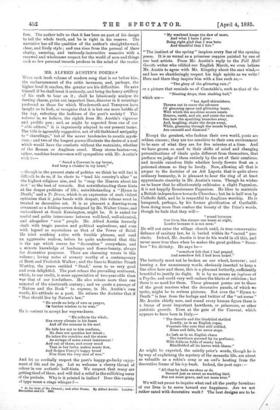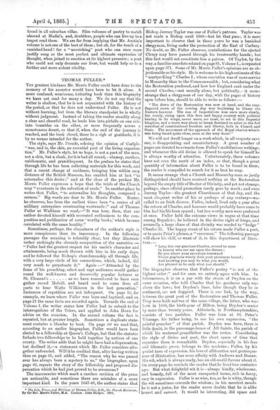MR. ALFRED AUSTIN'S POEMS.* \Writ each fresh volume of modern
song that is set before him, the embarrassment of the critic increases, and, perhaps, the higher level it reaches, the greater are his difficulties. He asks himself if he shall treat it seriously, and bring the heavy artillery of his craft to bear on it ; shall he laboriously analyse its fleeting charm, point out imperfect lines, discover in it meanings profound as those for which Wordsworth and Tennyson have taught us to look, or recognise that it is but one more bubble of the clay, reflecting the fashions of the poet's society ? This volume is, we believe, the eighth from Mr. Austin's vigorous and prolific pen ; and, as might be expected from one of our " able editors," it is ingeniously adapted to our present tastes. The title is agreeably suggestive, not of old-fashioned antipathy to " shavelings," but of the newer tendencies to ascetic mysticism ; and two of the longest poems illustrate the desire of a soul which would have the comforts without the restraints, whether of the Roman or Anglican creed. Many storm-beaten—or, rather, machine-beaten—men will sympathise with Mr. Austin's wish to
" found a Convent in my breast, And keep a cloister in my heart,"
—though in the present state of politics we think he will find it difficult to do so, if he elects to "tend his country's altar" as the highest religious aim, and to "reap the Heaven about his feet" as the best of rewards. But notwithstanding these hints at the deeper problems of life ; notwithstanding a " Hymn to Death," and a Te Deuin, which is an expression of such violent optimism that it joins hands with despair, this volume must be treated as decorative art. It is as pleasant a drawing-room ornament as a folding-screen designed by Mr. Walter Crane, and embroidered at South Kensington, might be. It is suited for useful and polite intercourse between well-bred, well-educated, and altogether " nice " people. Mr. Alfred Austin formerly dealt with tragic passion and political aspirations, and even with legend as mysterious as that of the Tower of Babel. He tried scathing satire with forcible phrases, and used an aggressive realism, before he quite understood that this is the age which craves for " decoration " everywhere, and a minute knowledge of landscape and flower-beauty, always for decorative purposes. There are charming verses in this volume ; loving notes of scenery worthy of a contemporary of Brett and Frederick Walker ; and the lines to Beatrice Stuart Wortley, the poem entitled " Dead," seem to us very good and even delightful. The poet echoes the prevailing sentiment, which, to our credit, is more appreciative of two-year-olds than was that of our forefathers. He also echoes more than one minstrel of the nineteenth century; and we quote a passage of " Nature and the Book " to express, in Mr. Austin's own words, his attitude as a poet. He refuses the doctrine that if "Man should live by Nature's law,"
" He needs no help of awe or prayer, Or farther wisdom to be wise."
He is content to accept her waywardness.
"He reflects the whole,
Has every climate in his heart And all the seasons in his soul.
He bids her not to him conform, He does not question her intent ; He takes the sunshine and the storm
As strings of some sweet instrument ! And out of these, and every mood That in her lurks, makes music flow, And fledges Fancy's happy brood E'en from the very nest of woe."
And let us cordially respect the poet's happy-go-lucky enjoyment of life and its joy. Let us welcome a cheery thread of colour in our aesthetic half-tints. We suspect that many are getting tired of them, and will find a relief in the rollicking verse
of the prelude. Why is it printed in italics ? Does this variety of type mean a stage whisper F
"My manhood keeps the dew of morn, And what I have I give : Being right glad that I was born And thankful that I live."
" The instinct of the spring" inspires every line of the opening poem. It is as vernal as a primrose coppice painted by one of our best artists. From Mr. Austin's reply to the Pall Mall
Gazette writer who vilified our English March, we even believe Mr. Austin to agree with Mr. Kingsley about the east wind,—
and how we shudderingly respect his high spirits as we write ! Here and there they inspire him with a line such as,—
" The glory of the glittering rain ;" or a picture that reminds us of Constable's, such as that of the
" Slanting drops, then slashing bail,"
which are
" but April skirmishers, Thiown out to cover the advance Of gleaming spear and glittering lance, With which the sunshine scours amain Heaven, earth, and air, and routs the rain. See how the sparkling branches sway, And, laughing, shake the drops away, While, gleaming through the meads beyond, Are emerald and diamond."
Except the greatest, who fashion their own world, poets are seldom sincere ; they are too sensitive to their own environment to be sure of what they are for five minutes at a time. And we have grown so used to their shifts of mind and changing personifications of ideals quite different from themselves, that perforce we judge of them entirely by the art of their creations, and trouble ourselves little whether lovely flowers float on a poisoned stream so they be lovely. Now, allowing all that is proper to the doctrine of an Art Laputa that is quite above ordinary humanity, it is pleasant to hear the ring of at least approximate sincerity in Mr. Austin's verse. Though he wishes us to know that he affectionately cultivates a slight Paganism, it is not happily Renaissance Paganism. He likes to maintain a British independence towards Churches ; but he is half won by Catholic faith, and he is respectful to Anglican worship. He is hampered, perhaps, by his fornier glorification of Garibaldi. from doing more than confess the beauty of the Prior's words, though he feels that they will
" sound between Our lives, like stream one hears at night, Louder because it is not seen."
He will not enter the village church until, in true conservative defiance of sanitary law, he is buried within its " sacred " precincts. Indeed, Mr. Austin is true to his world in all this, and never more true than when he makes the great goddess " Somehow " his divinity. He says he— "somehow felt that I had prayed, And somehow felt I had been heard."
The butterfly must not be broken on our wheel, however ; and . barring a few unnecessary words, obviously inserted to keep a line alive here and there, this is a pleasant butterfly, sufficiently beautiful to justify its flight. It is by no means an ingenue of a Psyche, and could very well endure the blaits of criticism ; but there is no need for them. These pleasant poems are to those of the great masters what the decorative panels, of which we spoke, might be to serious pictures. Not even the "Hymn to Death " is free from the leafage and twitter of the " set-scene " Mr. Austin chiefly uses, and round every human figure there is a frame of more important hawthorn, or primroses, or other patriotic growth. Even at the gate of the Convent, which appears to have been in Italy,
" The throetle and the blackbird shrilled Loudly, as in an English copse, Fountain-like note that still refilled, Rises and falls, but never stops.
As lush as in an English chace The hawthorn guessed by its perfume, With folds on folds of snowy lace, Blindfolded all its leaves with bloom."
As might be expected, the saintly prior's words, though he is by way of explaining the mystery of the monastic life, are about as valuable as a robin's song or an owl's hooting from the decorative frame of his ivy-bush. Indeed, the poet says :—
" All that he bade me shun or do
Seemed just as sweet as warbling bird, But not more grave, and not more true."
We will not pause to inquire what end all the pretty furniture of our lives is to serve toward our happiness. Are we not rather sated with decorative work ? The best designs are to be
found in all suburban villas. Slim volumes of poetry to match abound at Mudie's, and, doubtless, people who can live-up to a teapot read them. We are far from implying that Mr. Austin's volume is not one of the best of them ; but oh, for the touch of a vanished band! for a "nourishing" poet who can once more justify song as the most perfect and ultimate expression 'of thought, when joined to emotion at its highest pressure ; a poet who could not only decorate our lives, but would help us to a further and more ardent vitality.



































 Previous page
Previous page